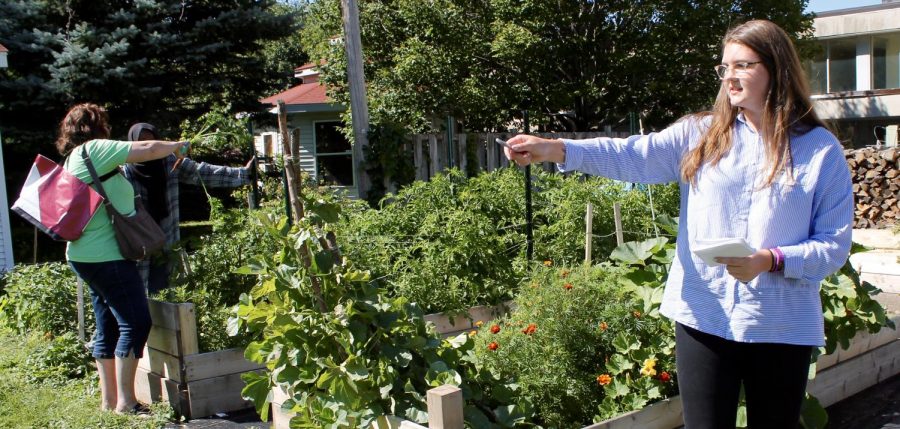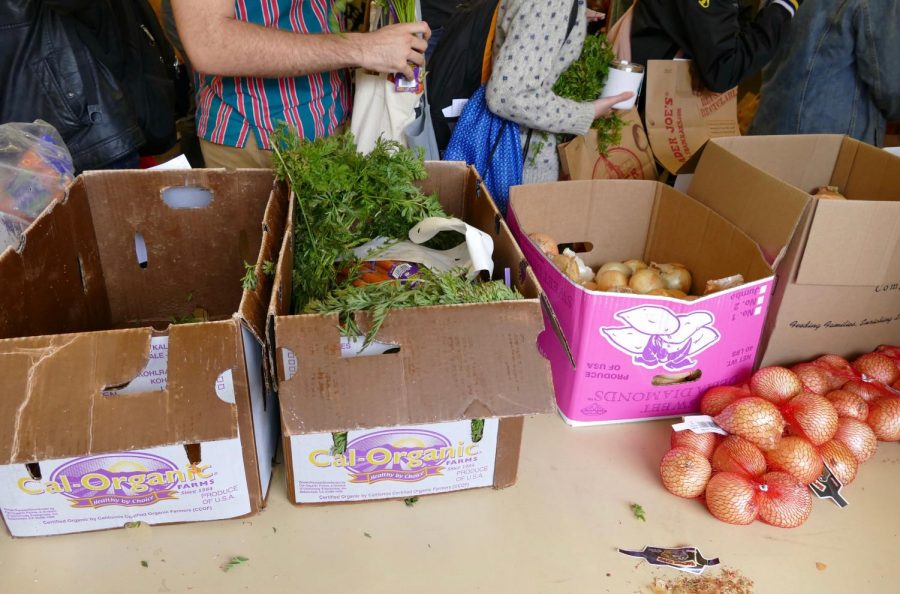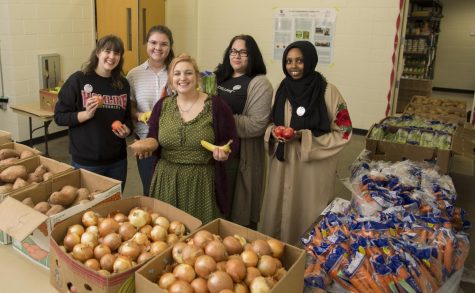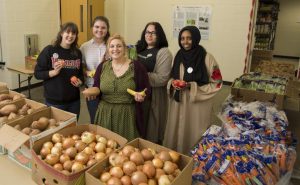Meet Emma Kiley, Hamline’s first Food Access VISTA worker
The Hamline community wins two victories for food access this fall.
Emma Kiley gives a group of first-years a “food tour” at the Micro Farm behind Hamline Church.
September 18, 2019
Pipers may remember 2019 alumna Emma Kiley as one of the masterminds behind the momentous Feed Your Brain Campaign (FYB) or for her commitment as a student worker in the sustainability office.
Now, in her first year of post-grad life, she finds herself hallowing Hamline’s halls again, this time as the first-ever Campus Food Access AmeriCorps VISTA.
VISTA, which stands for Volunteers in Service to America, is a subprogram of AmeriCorps whose aim is alleviating poverty. Individual VISTAs serve one-year terms, while their host site typically has the position for three years, regardless of whether the same person fills that role for the total period.
For their efforts, VISTAs are compensated with a living stipend near the poverty level in their service area, and will receive a cash award or scholarship upon their work’s completion.
Hamline started the application process to host a VISTA last November. A steering committee comprised of five faculty and staff members, including FYB adviser Susi Keefe, began devising a vision for what such a position would look like. This eventually developed into Kiley’s VISTA Assignment Description (VAD). The committee knew that food insecurity was a prominent area of concern on campus, and that combating it was a major goal.
“This could be a way to really think about taking this from being a student organization [FYB] providing direct services, to thinking about how Hamline as an institution can take [the issue of food access] on,” Keefe said in a paraphrase of her initial thoughts during the VISTA application process.
Based on Kiley’s tireless activism with FYB, the complementing research on food security in Minnesota that she conducted for her Departmental Honors thesis and her deep campus connections, the committee members agreed she would make an ideal VISTA.
“She knows the players in this local community really well,” Keefe said. “No other candidate came anywhere near her expertise… It was a very easy decision.”
The responsibilities in Kiley’s VAD involve coordinating direct services to the community. This includes taking over pop-up pantries and the Keystone Foodmobile, which used to fall under FYB’s jurisdiction. According to a previous Oracle article, ‘Refrigeration coming to a pantry near you,’ FYB used to be so busy organizing for pop-up pantries that they no longer had time to participate in community advocacy events relevant to their mission.
“In the past, Feed Your Brain was doing all things food access on campus,” Kiley said. “They were doing all the education and advocacy work through campaigns and their Facebook… but also coordinating and planning all of the direct services. Feed Your Brain is still doing all of the education, advocacy, policy work that you would think a student org would, and my role is largely to coordinate and plan.”
Kiley was in charge of the final pop-up pantry on Sept. 11, which served a record high of 333 students. She will also coordinate the Keystone Foodmobile and the soon-to-open Food Resource Center, which will replace the pop-up pantries.
“One of [the main priorities in my VAD] is creating and maintaining the infrastructure for the direct services, so that once there’s no longer a VISTA at Hamline, the services can continue, whether that be through having student workers staff the food pantry, or having a staff member on campus,” Kiley said.
Kiley will continue raising awareness and fighting against food insecurity in the Hamline community, with a focus on the demographics that are most likely to experience it. According to data analysis that FYB conducted with a University of Minnesota biostatistician in 2018, 80 percent of Pipers that claimed food insecurity in that spring’s Food Access Survey were students of color.
After her year of service is up, Kiley hopes to attend graduate school, perhaps for public policy, and continue her environmental and food justice work in the nonprofit sector.
“All of us who have worked with her feel honored and grateful [that] she chose to stay on campus for another year,” Professor Valentine Cadieux, another steering committee member and Kiley’s undergraduate adviser, said. “We’re excited to see and help the Food Resource Center develop.”
The Food Resource Center, a HUSC-funded permanent pantry equipped with a refrigerator, opens on Sept. 25 and is located by the Walker Fieldhouse loading dock. It can be accessed on Wednesdays and Thursdays, from 11 a.m. to 1 p.m. and 4 to 6 p.m. Questions should be directed to foodaccess@hamline.edu.









